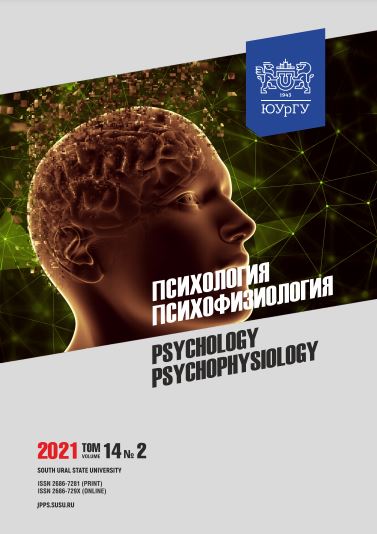PSYCHOLOGICAL RESOURCES FOR PROJECT ACTIVITIES IN TEACHERS RESPONSIBLE FOR ACADEMIC COMPETITIONS
Abstract
Abstract. The relevance of this study is associated with the search for models for managing teacher's activities in the context of the development of academic competitions and inclusion of gifted students in such competitions. Of particular importance is the teacher's willingness to work in an unpredictable situation and to overcome difficulties associated with project activities.
Aim: the paper aims to study hardiness and tolerance for uncertainty as psychological resources of teachers with different project experience. Materials and methods: The study involved 157 school teachers in the Leningrad Region. For the purpose of the study, all teachers were divided into four groups. Two experimental groups, a control and an additional group were formed from the participants in the regional program for the promotion of academic competitions. Psychological diagnostics was carried out using the S. Maddi hardiness test and the S. Budner Tolerance for Uncertainty questionnaire. Statistical processing of the data obtained was performed by means of descriptive statistics, comparative analysis (Mann-Whitney test) and correlation analysis (Spearman's rank correlation coefficient). Results: Differences were revealed in terms of the level of hardiness and tolerance for uncertainty, as well as in the structure of their relationships between groups: 1) with a high and low expert grade of teamwork projects; 2) with efficient teamwork and teachers who work individually with students involved in academic competitions. The most significant psychological resources for their project activities are risk acceptance and tolerance for uncertainty. Conclusion: The article analyzes the features of hardiness and tolerance for uncertainty as psychological resources for project activities in teachers responsible for academic competitions. The teamwork resource potential has been proved, which makes it possible to reduce resistance to uncertainty and to enhance problem solving skills.
Downloads
References
2. Timoshchenko A.S., Gryazeva-Dobshinskaya V.G., Dmitrieva Yu.A. Adaptive Resources of Subjects with Different Strategies for Choosing a Way of Life in a Stress Situation of Organizational Changes. Psikhologiya. Psikhofiziologiya = Psychology. Psychophysiology. 2020; 13 (4): 49–57. (in Russ.). DOI: 10.14529/jpps200406
3. Ivanova T., Leontiev D., Osin E., Rasskazova E., Kosheleva N. Contemporary issues in the research of personality resources at work. Organizatsionnaya psikhologiya = Organizational psychology. 2018; 8 (1): 85–121. (in Russ.) https://www.elibrary.ru/item.asp?id=35088255
4. Markina N.V., Soldatova E.L., Kachuro I.L., Gavriliuc A. Personal and existential-psychological resources of form tutors working with gifted children. Obrazovanie i nauka = The Education and Science Journal. 2021; 1: 102–135. (in Russ.) DOI: 10.17853/1994-5639-2021-1-102-135
5. Titova M.A. Self-regulation resources and job satisfaction in professionals under work stress. European Proceedings of Social and Behavioural Sciences. 2020; 91. DOI: 10.15405/epsbs.2020.10.04.34
6. Vyboyshchik I.V., Inozemtcev D.V., Karlyshev G.V., Yusupova Yu.L. Method development of professional evaluation accuracy study. Vestnik Yuzhno-Ural'skogo gosudarstvennogo universiteta. Seriya: Psikhologiya = Bulletin of the South Ural State University. Series Psychology. 2010; 4 (80): 58–62. (in Russ.) https://www.elibrary.ru/item.asp?id=14453245
7. Maddi S.R. Hardiness as the Existential Courage to Grow Through Searching for Meaning. The Experience of Meaning in Life. Hicks J., Routledge C. (eds). New York. Springer. Dordrecht. 2013: 227–239. DOI: 10.1007/978-94-007-6527-6_18
8. Kobasa S.C., Maddi S.R., Kahn S. Hardiness and health: A prospective study. Journal of Personality and Social Psychology. 1982; 42 (1): 168–177. DOI: 10.1037//0022-3514.42.1.168
9. Makhnach A.V. Resilience in conditions of uncertainty. Organizatsionnaya psikhologiya i psikhologiya truda = Organizational Psychology and Psychology of Labor. 2020; 5 (4): 131–166. (in Russ.) DOI: 10.38098/ipran.opwp.2020.17.4.006
10. Vasilieva S.N, Rylskaya E.A. Constructing the definition of the concept “resilience of the professional”. Yaroslavskii pedagogicheskii vestnik = Yaroslavl Pedagogical Bulletin. 2019; 2 (107): 106–113. (in Russ.) DOI: 10.24411/1813-145X-2019-10358
11. Kalinina N.V., Volodina T.V. Psychological factors of teachers resilience. Izvestiya Samarskogo nauchnogo tsentra Rossiiskoi akademii nauk = Izvestia of Samara Scientific Center of the Russian Academy of Sciences. 2009; 11 (4-2): 398–403. (in Russ.) https://www.elibrary.ru/item.asp?id=13619540
12. Budner S. Intolerance of Ambiguity as a Personality Variable. Journal of Personality. 1962; 30: 29–50. DOI: 10.1111/j.1467-6494.1962.tb02303.x
13. Kornilova T.V., Chumakova М.A. Tolerance and intolerance of ambiguity in the modification of Budners questionnaire. Eksperimentalnaya psikhologiya = Experimental psychology. 2014; 1: 92–110. (in Russ.) https://www.elibrary.ru/item.asp?id=21588520
14. Rokitskaya Yu.A., Manucharyan N.S. Formation of tolerance to uncertainty in the process of professional self-determination of high school students: monograph. Chelyabinsk. “A. Miller Library”, 2019. 176 p. (in Russ.) https://www.elibrary.ru/item.asp?id=41559779
15. Vodopyanova N.E. Modern concepts of the resources of a subject of professional activity. Vestnik Sankt-Peterburgskogo universiteta. Psikhologiya. Pedagogika = Vestnik of Saint Petersburg University. Psychology. Pedagogy. 2015; 1: 45–54. (in Russ.) https://www.elibrary.ru/item.asp?id=23412447
16. Brouzos A., Vassilopoulos S.P., Baourda V.C., Tassi C., Stavrou V., Moschou K., Brouzou K.O. “Staying Home – Feeling Positive”: Effectiveness of an on-line positive psychology group intervention during the COVID-19 pandemic. Curr Psychol. 2021: 1-13. DOI: 10.1007/s12144-021-01613-x.
17. Schaufeli, W.B., Salanova, M., González-romá, V. et al. The Measurement of Engagement and Burnout: A Two Sample Confirmatory Factor Analytic Approach. Journal of Happiness Studies. 2002; 3: 71–92. DOI: 10.1023/A:1015630930326
И.Л. Качуро, Е.Л. Солдатова, А. Гаврилюк // Образование и наука. 2021. № 1. С. 102–135. DOI: 10.17853/1994-5639-2021-1-102-135
References on translit
-Copyright (c) 2021 Psychology. Psychophysiology

This work is licensed under a Creative Commons Attribution-NonCommercial-NoDerivatives 4.0 International License.



